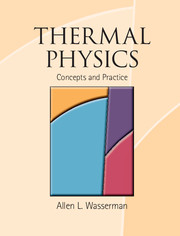Book contents
- Frontmatter
- Contents
- Preface
- 1 Introducing thermodynamics
- 2 A road to thermodynamics
- 3 Work, heat and the First Law
- 4 A mathematical digression
- 5 Thermodynamic potentials
- 6 Knowing the “unknowable”
- 7 The ideal gas
- 8 The two-level system
- 9 Lattice heat capacity
- 10 Elastomers: entropy springs
- 11 Magnetic thermodynamics
- 12 Open systems
- 13 The amazing chemical potential
- 14 Thermodynamics of radiation
- 15 Ideal Fermi gas
- 16 Ideal Bose–Einstein system
- 17 Thermodynamics and the cosmic microwave background
- Appendix A How pure is pure? An inequality
- Appendix B Bias and the thermal Lagrangian
- Appendix C Euler's homogeneous function theorem
- Appendix D Occupation numbers and the partition function
- Appendix E Density of states
- Appendix F A lab experiment in elasticity
- Appendix G Magnetic and electric fields in matter
- Appendix H Maxwell's equations and electromagnetic fields
- Appendix I Fermi–Dirac integrals
- Appendix J Bose–Einstein integrals
- Index
15 - Ideal Fermi gas
Published online by Cambridge University Press: 05 June 2012
- Frontmatter
- Contents
- Preface
- 1 Introducing thermodynamics
- 2 A road to thermodynamics
- 3 Work, heat and the First Law
- 4 A mathematical digression
- 5 Thermodynamic potentials
- 6 Knowing the “unknowable”
- 7 The ideal gas
- 8 The two-level system
- 9 Lattice heat capacity
- 10 Elastomers: entropy springs
- 11 Magnetic thermodynamics
- 12 Open systems
- 13 The amazing chemical potential
- 14 Thermodynamics of radiation
- 15 Ideal Fermi gas
- 16 Ideal Bose–Einstein system
- 17 Thermodynamics and the cosmic microwave background
- Appendix A How pure is pure? An inequality
- Appendix B Bias and the thermal Lagrangian
- Appendix C Euler's homogeneous function theorem
- Appendix D Occupation numbers and the partition function
- Appendix E Density of states
- Appendix F A lab experiment in elasticity
- Appendix G Magnetic and electric fields in matter
- Appendix H Maxwell's equations and electromagnetic fields
- Appendix I Fermi–Dirac integrals
- Appendix J Bose–Einstein integrals
- Index
Summary
Why is it that particles with half-integer spin are Fermi particles whereas particles with integer spin are Bose particles? An explanation has been worked out by Pauli from complicated arguments from quantum field theory and relativity. He has shown that the two must necessarily go together … but we have not been able to reproduce his arguments on an elementary level. This probably means we do not have a complete understanding of the fundamental principle involved…
R. P. Feynman, R.B. Leighton and M. Sands, Feynman Lectures on Physics, Volume 3, Chapter 4, Section 1, Addison-Wesley, Reading, MA (1963)Introduction
Particles with half-integer angular momentum obey the Pauli exclusion principle (PEP) – a restriction that a non-degenerate single-particle quantum state can have occupation number of only 0 or 1. This restriction was announced by W. Pauli in 1924 for which, in 1945, he received the Nobel Prize in Physics. Soon after Pauli, the exclusion principle was generalized by P. Dirac and E. Fermi who – independently – integrated it into quantum mechanics. As a consequence half-integer spin particles are called Fermi–Dirac particles or fermions. PEP applies to electrons, protons, neutrons, neutrinos, quarks – and their antiparticles – as well as composite fermions such as He3 atoms. Thermodynamic properties of metals and semiconductors are largely determined by electron (fermion) behavior.
- Type
- Chapter
- Information
- Thermal PhysicsConcepts and Practice, pp. 228 - 245Publisher: Cambridge University PressPrint publication year: 2011



